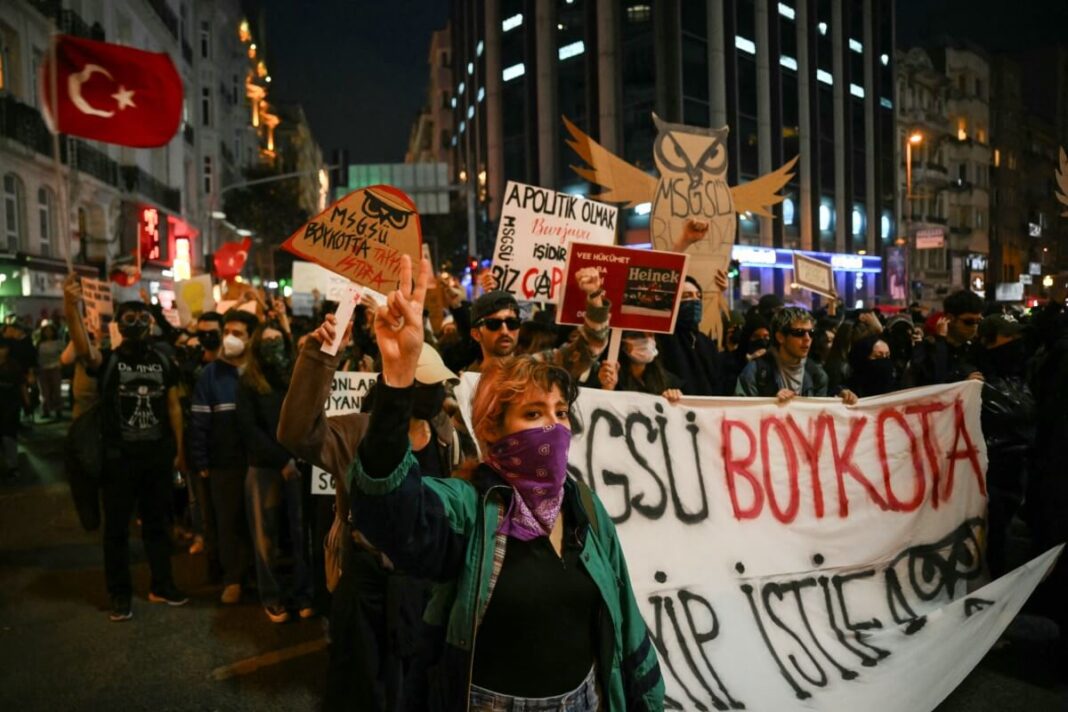Turkish authorities have detained nearly 1,500 people as nationwide protests sparked by the detention and subsequent arrest of the mayor of İstanbul entered their second week on Wednesday, marking the largest wave of street unrest since the 2013 Gezi Park demonstrations.
The protests began on March 19 following the detention of İstanbul Mayor Ekrem İmamoğlu in connection with corruption and terrorism-related investigations, which his supporters have denounced as a “political coup.”
Large crowds have rallied daily, defying protest bans in İstanbul, Ankara and İzmir, with unrest spreading across much of the country.
In a possible shift in strategy, the main opposition Republican People’s Party (CHP) said it would not call for another nighttime rally outside the İstanbul mayor’s office on Wednesday, urging supporters instead to join a large gathering planned for Saturday.
But it remained unclear whether students — who have played an increasingly visible role in the protests and are not all aligned with CHP — would stay off the streets.
Most nights have seen clashes between protesters and riot police, whose use of force has drawn criticism from rights groups. There were no reported confrontations on Tuesday, according to AFP correspondents.
By Tuesday afternoon police had detained 1,418 people, Interior Minister Ali Yerlikaya said.
Among those detained were 11 journalists covering the protests. Seven were remanded into custody, including AFP photographer Yasin Akgül.
The move was condemned by press freedom groups and the Paris-based news agency, which called the jailing of the 35-year-old “unacceptable” and demanded his immediate release.
İmamoğlu, 53, who was jailed on Sunday, is widely seen as the only politician capable of defeating President Recep Tayyip Erdoğan in a future election.
‘No room left in İstanbul prisons’
Speaking to a crowd outside İstanbul City Hall on Tuesday night, CHP leader Özgür Özel said the crackdown would only strengthen the movement.
“There is one thing Mr. Tayyip [Erdoğan] should know: Our numbers won’t decrease with detentions — we will grow and grow,” he said.
Özel claimed that the scale of the detentions had overwhelmed local facilities. “There’s no room left in İstanbul’s prisons,” he said.
His comments came shortly after Yerlikaya warned there would be “no concessions” for people who “terrorize the streets.”
According to the state-run Anadolu news agency, courts have jailed 172 people for “provoking recent social unrest, committing violence, covering their faces and carrying sticks.” Thirty-five others were released under judicial supervision, while one person was freed outright.
Additional arrests were reported overnight by unions and student groups, though there was no updated figure from the interior ministry.
President Erdoğan remained defiant as the protests enter their second week, labeling the demonstrations “street terror.”
“Those who spread terror in the streets and want to set fire to this country have nowhere to go. The path they have taken is a dead end,” Erdoğan said.
‘We are not terrorists’
Despite the crackdown, turnout has remained strong. Most students at Tuesday’s large rally had their faces covered, according to an AFP correspondent.
“We want the government to resign. We want our democratic rights. We are fighting for a freer Turkey,” said Mali, a 20-year-old student who declined to give his surname, citing safety concerns.
“We are not terrorists — we are students. We are here to defend democracy.”
Another protester, Lydia, 25, urged others to join the movement.
“All Turkish people should take to the streets. They are hunting us like vermin while you sit at home,” she said. “Come out, look after us. We are your students — we are your future.”
While the CHP canceled Wednesday’s rally at City Hall, Özel called for mass participation in Saturday’s planned demonstration in Maltepe, where the party is expected to demand early elections.



